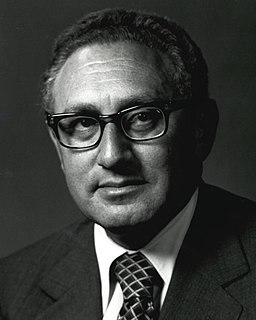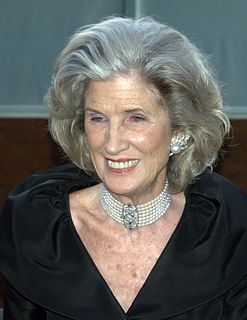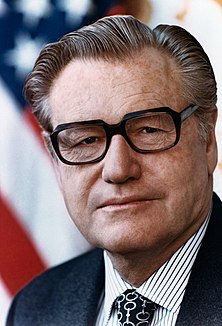Related Research Articles

Henry Alfred Kissinger is an American politician, diplomat, and geopolitical consultant who served as United States Secretary of State and National Security Advisor under the presidential administrations of Richard Nixon and Gerald Ford. A Jewish refugee who fled Nazi Germany with his family in 1938, he became National Security Advisor in 1969 and U.S. Secretary of State in 1973. For his actions negotiating a ceasefire in Vietnam, Kissinger received the 1973 Nobel Peace Prize under controversial circumstances, with two members of the committee resigning in protest.

The Council on Foreign Relations (CFR), founded in 1921, is a United States nonprofit think tank specializing in U.S. foreign policy and international affairs. It is headquartered in New York City, with an additional office in Washington, D.C. Its membership, which numbers 5,103, has included senior politicians, more than a dozen secretaries of state, CIA directors, bankers, lawyers, professors, and senior media figures.
The Rockefeller Foundation is an American private foundation based at 420 Fifth Avenue, New York City. It was established by the prominent Rockefeller family in New York State on May 14, 1913, when its charter was formally accepted by the New York State Legislature. The foundation was started by Standard Oil co-founder John D. Rockefeller ("Senior"), along with his son John D. Rockefeller Jr. ("Junior"), and Senior's principal business and philanthropic advisor, Frederick Taylor Gates.

Gordon Evans Dean was a Seattle-born American lawyer and prosecutor who served as chairman of the United States Atomic Energy Commission (AEC) from 1950 to 1953.

William Pierce Rogers was an American politician, diplomat, and lawyer. He served as United States Attorney General under President Dwight D. Eisenhower and United States Secretary of State under President Richard Nixon. Despite Rogers being a close confidant of Nixon, National Security Advisor Henry Kissinger overshadowed Rogers and eventually succeeded him as Secretary of State.
United States Objectives and Programs for National Security, better known as NSC 68, was a 66-page top secret National Security Council (NSC) policy paper drafted by the Department of State and Department of Defense and presented to President Harry S. Truman on 7 April 1950. It was one of the most important American policy statements of the Cold War. In the words of scholar Ernest R. May, NSC 68 "provided the blueprint for the militarization of the Cold War from 1950 to the collapse of the Soviet Union at the beginning of the 1990s." NSC 68 and its subsequent amplifications advocated a large expansion in the military budget of the United States, the development of a hydrogen bomb, and increased military aid to allies of the United States. It made the rollback of global Communist expansion a high priority. NSC 68 rejected the alternative policies of friendly détente and containment of the Soviet Union.

The Center for Strategic and International Studies (CSIS) is a think tank based in Washington, D.C., in the United States. CSIS was founded as the "Center for Strategic and International Studies" of Georgetown University in 1962. The center conducts policy studies and strategic analyses of political, economic and security issues throughout the world, with a specific focus on issues concerning international relations, trade, technology, finance, energy and geostrategy.
The Rockefeller family is an American industrial, political, and banking family that owns one of the world's largest fortunes. The fortune was made in the American petroleum industry during the late 19th and early 20th centuries by John D. Rockefeller and his brother William Rockefeller, primarily through Standard Oil The family had a long association with, and control of, Chase Manhattan Bank. By 1977, the Rockefellers were considered one of the most powerful families in American history. The Rockefeller family originated in Rhineland in Germany and family members moved to the New World in the early 18th century, while through Eliza Davison, with family roots in Middlesex County, New Jersey, John D. Rockefeller and William Rockefeller Jr. and their descendants are also of Scotch-Irish ancestry.

Laurance Spelman Rockefeller was an American businessman, financier, philanthropist, and conservationist. Rockefeller was a son of John D. Rockefeller Jr. and Abby Aldrich Rockefeller. As a trustee of the Rockefeller Brothers Fund, he provided venture capital for Intel, Apple Computer and many other successful start-ups. Rockefeller was known for his involvement in wilderness preservation, ecology and the protection of wildlife. His crusade was the establishing of a conservation ethic, and he was declared America's leading conservationist by Lady Bird Johnson.

David Rockefeller was an American banker who served as chairman and chief executive of Chase Manhattan Corporation. He was the oldest living member of the third generation of the Rockefeller family, and family patriarch from August 2004 until his death in March 2017. Rockefeller was the youngest child of John D. Rockefeller Jr. and Abby Aldrich Rockefeller, and a grandson of John D. Rockefeller and Laura Spelman Rockefeller.
The President's Intelligence Advisory Board (PIAB) is an advisor to the Executive Office of the President of the United States. According to its self-description, it "...provides advice to the President concerning the quality and adequacy of intelligence collection, of analysis and estimates, of counterintelligence, and of other intelligence activities."

Kykuit, known also as the John D. Rockefeller Estate, is a 40-room historic house museum in Pocantico Hills, a hamlet in the town of Mount Pleasant, New York. The house was built for oil tycoon and Rockefeller family patriarch John D. Rockefeller. Conceived largely by his son, John D. Rockefeller, Jr., and enriched by the art collection of the third-generation scion, Governor of New York, and Vice President of the United States, Nelson Rockefeller, it was home to four generations of the family. The house is a National Historic Landmark owned by the National Trust for Historic Preservation, and tours are given by Historic Hudson Valley.

Nancy Sharon Kissinger is an American philanthropist, and the wife of former U.S. Secretary of State Henry Kissinger. The couple married on March 30, 1974, in Arlington, Virginia.
The Rockefeller Brothers Fund (RBF) is a philanthropic foundation created and run by members of the Rockefeller family. It was founded in New York City in 1940 as the primary philanthropic vehicle for the five third-generation Rockefeller brothers: John, Nelson, Laurance, Winthrop and David. It is distinct from the Rockefeller Foundation. The Rockefellers are an industrial, political and banking family that made one of the world's largest fortunes in the oil business during the late 19th and early 20th centuries.
The Sylvanus Thayer Award is an honor given annually by the United States Military Academy at West Point to an individual whose character and accomplishments exemplifies the motto of West Point. The award is named after the 'Father of the Military Academy,' Colonel Sylvanus Thayer. The awardee is selected by, and the award is endowed by, a committee formed from the West Point Association of Graduates. It has been awarded annually since 1958 and is the closest recognition West Point has to granting an honorary degree.
Executive oversight of United States covert operations has been carried out by a series of sub-committees of the National Security Council (NSC).

Nelson Aldrich Rockefeller was an American businessman and politician who served as the 41st vice president of the United States from 1974 to 1977, and previously as the 49th governor of New York from 1959 to 1973. He also served as assistant secretary of State for American Republic Affairs for Presidents Franklin D. Roosevelt and Harry S. Truman (1944–1945) as well as under secretary of Health, Education and Welfare under Dwight D. Eisenhower from 1953 to 1954. A grandson of billionaire John D. Rockefeller and a member of the wealthy Rockefeller family, he was a noted art collector and served as administrator of Rockefeller Center in Manhattan, New York City.
Albert Hadley Cantril, Jr. was a Princeton University psychologist who expanded the scope of the field.
The Rockefeller Archive Center is an independently operated foundation that was initially established to serve as a repository for the records of Rockefeller University and various Rockefeller family philanthropy projects. Until 2008, it was a division of Rockefeller University.
The National Institute of Social Sciences (NISS) is one of the oldest honorary societies in the United States. Established in 1913, NISS promotes the study of the social sciences, supports social science research and discussion, and presents Gold Medals to individuals who have rendered distinguished service to humanity.
References
- 1 2 3 "Rockefeller Brothers Fund Archives, 1941-1989".
- ↑ John III Andrew (1998). "Cracks in the Consensus: The Rockefeller Brothers Fund Special Studies Project and Eisenhower's America". Presidential Studies Quarterly. 28.
- ↑ Philip Benjamin (January 6, 1958). "Arms Rise Urged Lest Reds Seize Lead in 2 Years". The New York Times. p. 1.
- ↑ Rushed release of military subpanel's report - see Cary Reich, The Life of Nelson A. Rockefeller: Worlds to Conquer, 1908-1958, New York: Doubleday, 1996. (pp.650-667)